|

Left: Mark Criden, Tim Thomas, Roland Riesen,
Trinka Dykes, John Blackwood, Jeff Faunce, Amy McClellan, Dave Nelson, Rick
Dayan, Larry Meehan, Jeff Gillikin, George Heritier, Pam Gillikin
Down in Front: Bob Graeter, Larry the Little, Mary Meehan, Michael Meehan, Kim
Adams
Friday
I changed my MO from previous years in Toledo, in that I didn’t try to taste
everything that was opened, but instead, focused on specific groups of wines,
most of them European. For the most part, the only Californian wines I tasted
were those made by personal favorites, such as Mr. Ridge and Sean Thackrey. The
evening started off perfectly, with a “grower Champagne” from a producer that
I’d never encountered before.
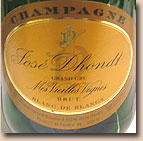 Champagne Jose Dhondt Blanc de Blancs à Oger Vieilles Vignes NV, 12% alc.:
Medium straw color, with lots of yeast and flint-y mineral, a solid core of
under-ripe apple and a little smoke in the background. Lots of zip and a heady
mousse; this gives a ton of everything I love about Champagne! Find this wine Champagne Jose Dhondt Blanc de Blancs à Oger Vieilles Vignes NV, 12% alc.:
Medium straw color, with lots of yeast and flint-y mineral, a solid core of
under-ripe apple and a little smoke in the background. Lots of zip and a heady
mousse; this gives a ton of everything I love about Champagne! Find this wine
Unfortunately, the whites that I tasted this evening were rather underwhelming,
which is somewhat surprising, considering some of the producers.
1997 Luneau - Papin Le L d’Or Muscadet Sèvre et Maine Sur Lie, 12% alc.:
Pale straw color, with flavors and aromas reminiscent of wet stones, under-ripe
apples and rain water; only moderate acidity here, which is surprising,
especially considering a brilliant and still very lively ’93 that we enjoyed on
Friday of Toledo 5. Maybe you need to sit down with this and drink it with a
bucket of mussels to consider it on its own terms, or maybe it is just a tired
bottle; whatever the case, it was lost in the crowd, and it was only the 2nd
wine of the night! Find this wine
2002 Phillipe Tessier Cours-Cheverny Les Sables, 12.5% alc.: Pale to
medium straw color, with dust on the nose; not dusty fruit, just dust, and some
alcohol as well. Pleasant enough apple and melon flavors, with mineral and
again, some alcohol. I’m ambivalent about this one.
Find this wine
Francois Chidaine Montlouis Sur Loire Brut, 12.5% alc.: Medium straw
color, with one-dimensional apple flavors and aromas; little here to hold my
attention, but it might make good vinegar. Find this wine
2000 Hirsch Zobinger Gaisberg Riesling Alte Reben Kamptal/Osterreich, 13%
alc.: Medium straw color, with petrol, mineral and green apple aromatics that
promise more than the flavors deliver; relatively low acidity, and frankly,
disappointing.
Find this wine
2003 Paul Zinck Tokay Pinot Gris Prestige, 13% alc.: Pale to medium straw
color, with a surprising note of licorice muscling in on the melon and peach on
the nose; pleasant enough flavors echo, with less acidity that one would expect
and a slightly oily texture. This was a sample given to me by the local
distributor, and based on its performance, I didn’t buy.
Find this wine
With five white duds in a row, it was time to cut my losses and switch to the
reds, and what better to Go-to than our #1 Go-to, Mr. Ridge?
1990 Ridge York Creek Petite Sirah, 86% Petite Sirah, 14% Zinfandel,
13.9% alc.: Still a deep, dark garnet color, with just a hint of rust; deep,
dark plums and berries with earthy undertones and a good dose of Draper perfume
on the nose. Flavors echo, with still significant tannins and acids, and even
more earth. This needs years to mellow; it’s all there, just give it more
time (10 years isn’t at all out of the question). Find this wine
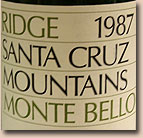 1987 Ridge Monte Bello, 92% Cabernet Sauvignon, 5% Merlot, 3% Cabernet
Franc, 11.7% alc.: Dark garnet color, with little rust to speak of; big dense
black currant nose, with some lavender, a nice whiff of Draper perfume and a
surprising note of bell pepper. Flavors echo with less bell pepper; well
structured and still a young wine in many respects, if this bottle is any
indication, with a solid core of fruit that’s not going to fade anytime soon.
Some found this a little “weird and atypical,” but I think it just needs a good
medium rare rib eye steak to really set it off. Find this wine 1987 Ridge Monte Bello, 92% Cabernet Sauvignon, 5% Merlot, 3% Cabernet
Franc, 11.7% alc.: Dark garnet color, with little rust to speak of; big dense
black currant nose, with some lavender, a nice whiff of Draper perfume and a
surprising note of bell pepper. Flavors echo with less bell pepper; well
structured and still a young wine in many respects, if this bottle is any
indication, with a solid core of fruit that’s not going to fade anytime soon.
Some found this a little “weird and atypical,” but I think it just needs a good
medium rare rib eye steak to really set it off. Find this wine
1995 Sean Thackrey Orion Rossi Vineyard, 13.9% alc.: Some commented on
the overwhelming mint-eucalyptus that predominates in this deep dark garnet
colored wine, but neither Kim nor this taster had the same impression; Kim got
little if any mint, and while I may have detected a little, what I really get
from this is a lot of rich, dark plums and berries that show a nice note of
perfectly integrated oak; this is a little more fruit forward and less Euro than
the ’98 and ’99 models, being dense, well structured and not that complex.
It seems to have the guts to develop and improve for some years yet, and I like
this more than those that are put off by the so-called mint. Just my 2 oz. Find this wine
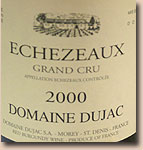
2000 Domaine Dujac Echezeaux, 13% alc.: Slightly rusty, smoky ruby garnet
color, with lovely aromatics of mahogany, roses, smoky plums and black cherries
that echo and expand on the palate; well structured for further development, but
already drinking REALLY well, and everybody loves it. Find this wine
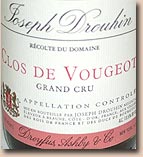 1989 Joseph Drouhin Clos de Vougeot Grand Cru, 13.5% alc.: Slightly rusty
ruby garnet color, with a stingy nose and middleweight earth, plums and cherries
on the palate; somewhat silky, with moderate tannins and acids, and a different
animal than the Dujac and Chevillon, but just as interesting in its own, more
well-behaved way. Find this wine 1989 Joseph Drouhin Clos de Vougeot Grand Cru, 13.5% alc.: Slightly rusty
ruby garnet color, with a stingy nose and middleweight earth, plums and cherries
on the palate; somewhat silky, with moderate tannins and acids, and a different
animal than the Dujac and Chevillon, but just as interesting in its own, more
well-behaved way. Find this wine
1990 Robert Chevillon Nuits-Saint-Georges Les Saint-Georges, 13.5% alc.:
A rusty dark garnet color, offering flavors and aromas of BIG smoky plums
anchored by a solid earthy base; substantial and full bodied; the smoke sets the
tone here, and there’s still some structure here to take this further on down
the road. Some found this disappointing, and while I don’t have a lot of
experience with these, it does seem to be in an intermediate phase, not being
terribly complex and by no means fully mature. Find this wine
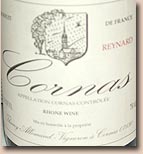 1998 Allemand Cornas Reynard, 12.5% alc.: Like drinking a glass of ink,
this is all bacon, black olives and floral fruit on the nose, so much so that I
just want to sit and smell it, but taste it I do, and while it’s not quite as
generous on the palate, it still shows that intense syrah character, turning
somewhat astringent on the finish. I usually take that astringency as an
indication of a wine that needs more time, and this one certainly does, but it
has the structure and depth of fruit to develop and improve for many years.
Hopefully, we’ll be around when Blackie opens another one, in, oh, say five
years or so…Find this wine 1998 Allemand Cornas Reynard, 12.5% alc.: Like drinking a glass of ink,
this is all bacon, black olives and floral fruit on the nose, so much so that I
just want to sit and smell it, but taste it I do, and while it’s not quite as
generous on the palate, it still shows that intense syrah character, turning
somewhat astringent on the finish. I usually take that astringency as an
indication of a wine that needs more time, and this one certainly does, but it
has the structure and depth of fruit to develop and improve for many years.
Hopefully, we’ll be around when Blackie opens another one, in, oh, say five
years or so…Find this wine
2001 Vernay Côte-Rôtie, 12.5% alc.: Dark garnet color, fading to pink at
the rim; a middle weight pretender that’s out of its league after the Allemand –
earth, plums and red berries. Not a “bad” wine, but… Find this wine
1978 Olga Raffault Chinon, 1.5 L, 12% alc.: This old gal shows a rusty
ruby garnet color, and gives up a grudging nose that only offers a little dust;
more dust on the palate, along with earthy red currants and berries shaded with
a bit of bell pepper. My initial notes read “not dead by any means, but too much
dust for this taster.” This wasn’t exactly a big hit, so there was a goodly
amount left in the magnum that was packed up and brought home for Kim’s vinegar
crock. When I returned home after work on Sunday evening, she exclaimed, “The
Raffault Chinon ROCKS!” I poured myself a glass and damned if it wasn’t showing
better than it had two nights before, with more fruit and far less dust, a fine
testimonial indeed to this 29 year-old middleweight Cabernet Franc. It still did
contribute to next autumn’s vinegar, however…Find this wine
1999 Charles Joguet Chinon Clos de la Dioterie, $33.99, 13% alc.: I’ve
been following this ruby dark garnet colored Cab Franc since March of 2004, and
it still has a long life ahead of it; it shows nice herbal tinged black currant
and blackberry flavors and aromas, underpinned with an earthy core. Well
structured and slightly astringent, and my initial impression that this would
have benefited from as much as three hours in a decanter seemed to be vindicated
the next afternoon, when I had a glass that was more harmonious than the evening
before. We have some magnums of this resting comfortably that we’ll be in no
hurry to open anytime soon. Find this wine
1995 Joseph Phelps Insignia, 90% Cabernet Sauvignon, 7% Merlot, 3% Petite
Verdot, 13.5% alc.: Slightly rusty dark garnet color; my notes read, “Yup, it’s
Insignia all right – big spicy oak and fruit. I’m sorry, I just don’t like this
wine – DUMP!” Find this wine
1991 La Jota Cabernet Sauvignon Howell Mountain Selection, 13.5% alc.: La
Jota is a winery I wish I’d gotten to know better back before the Smiths sold to
Markham; they made long lived Cabernet that didn’t cater to trendy styles and
this dark garnet is a good example. It gives up slightly herbal black currant –
cassis with a note of mushrooms, solid earthy undercurrents and big bones, but
they’re kindly big bones. A solid, if unspectacular Cabernet that probably needs
to pair with a good steak to show its best, and I’d STILL rather drink it than
Insignia. Find this wine
2002 Gunderloch Nackenheim Rothenberg Rheinhessen Spätlese, $28.99, 9%
alc.: I took no notes on this wine, but it’s very much as I remember it
from
last July, when I was most impressed with it. At that time, I wrote: “Medium
straw to pale gold in color, with a steely undercurrent, river stones and petrol
over peach and apricot in both flavor and aroma; excellent cut, with a not quite
unctuous density to it, and a long, long finish.” Others seemed to like it as
well, and there’s still no reason to be in any hurry to open one, because it
will only get better over the next five years or more.” This one didn’t live to
see the morning. Find this wine
And then there was this little oddity brought along by David Nelson; I took one
sip and cried, "NO MAS!"
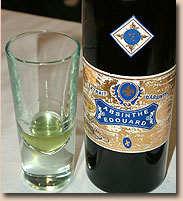 Absinthe
Edouard Distiller's Proof. 72% (yeah, that's 144
proof to us on this side of Absinthe
Edouard Distiller's Proof. 72% (yeah, that's 144
proof to us on this side of the pond). A recreation of one of the finest
Absinthes of its time from the fine folks at
Jade Liqueurs, this
pours a clear, viscous luminescent greenish yellow. Undiluted the nose is
powerful anise, cut with some dark woody notes. Dilution with cool water (no
sugar for me thanks) to a 3:1 ratio of water/Absinthe yields a lively swirling
louche, and releases a range of lemony citric aromas, as well as some bready
licorice. Surprisingly floral in the mouth, but then a rush of anise simply
overwhelms the palate. It has a lovely, satiny mouthfeel, and the finish, at
least at this level of dilution, rings for minutes. I prefer this as a digestif,
as it can overwhelm and numb the palate if taken before a meal. An interesting
history lesson, and worth trying for that reason alone in my book, though I
expect my bottle will be enough to last for quite a while.
Tasting Note By David Nelson the pond). A recreation of one of the finest
Absinthes of its time from the fine folks at
Jade Liqueurs, this
pours a clear, viscous luminescent greenish yellow. Undiluted the nose is
powerful anise, cut with some dark woody notes. Dilution with cool water (no
sugar for me thanks) to a 3:1 ratio of water/Absinthe yields a lively swirling
louche, and releases a range of lemony citric aromas, as well as some bready
licorice. Surprisingly floral in the mouth, but then a rush of anise simply
overwhelms the palate. It has a lovely, satiny mouthfeel, and the finish, at
least at this level of dilution, rings for minutes. I prefer this as a digestif,
as it can overwhelm and numb the palate if taken before a meal. An interesting
history lesson, and worth trying for that reason alone in my book, though I
expect my bottle will be enough to last for quite a while.
Tasting Note By David Nelson
Saturday
I started off with some bubbles on Saturday, and if I could have, I would have
stuck with them, but these bottles have a way of being drained; it seems I’m not
the only one who likes them. Like the Jose Dhondt Blanc de Blancs from Friday,
these were “grower” Champagnes, and all three were wicked good.
Champagne Diebolt-Vallois Tradition à Cramant NV, 12.5% alc.: Medium
straw color, with a tinge of peach; fine active bead, with an impressive mousse
and a smoky peach and apple nose. Very dry, with lots of minerality in the
mouth, under-ripe to the nth degree, and deliciously so; the yeasty quality
comes out with air as it opens and warms, getting better and better. Excellent
presence and intensity. Find this wine
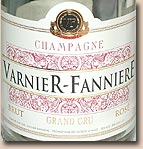 Champagne Varnier-Fannière Brut Rosé Grand Cru NV, disgorged 05/25/06:
Salmon straw color, with the big mousse and the very active bead; the tight nose
only gives a hint of cherry-ish aroma, but the flavors pick it up big-time with
plenty of cherry and strawberry underscored with a fine, earthy minerality.
Rich, with excellent cut and yet a certain smoothness to it; I could drink this
stuff all night. I actually tried to go back for more, but the rabble had had
their way with it and there was nothing but an empty husk of glass. Find this wine Champagne Varnier-Fannière Brut Rosé Grand Cru NV, disgorged 05/25/06:
Salmon straw color, with the big mousse and the very active bead; the tight nose
only gives a hint of cherry-ish aroma, but the flavors pick it up big-time with
plenty of cherry and strawberry underscored with a fine, earthy minerality.
Rich, with excellent cut and yet a certain smoothness to it; I could drink this
stuff all night. I actually tried to go back for more, but the rabble had had
their way with it and there was nothing but an empty husk of glass. Find this wine
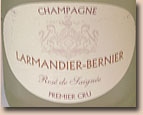 Champagne Larmandier-Bernier Brut Rosé de Saignée Premier Cru, 12% alc.:
This make an immediate impression by way of its intense dark raspberry pink
color, probably as dark a rosé as I’ve had the pleasure of knowing, sparkling or
otherwise; it has all the activity you could ask for in the glass and in the
mouth, and dishes out intense cherry-raspberry flavors and aromas with the
requisite subtle earth and mineral underneath. Excellent cut and very good
intensity here, making for one very fine Brut Rosé indeed. Find this wine Champagne Larmandier-Bernier Brut Rosé de Saignée Premier Cru, 12% alc.:
This make an immediate impression by way of its intense dark raspberry pink
color, probably as dark a rosé as I’ve had the pleasure of knowing, sparkling or
otherwise; it has all the activity you could ask for in the glass and in the
mouth, and dishes out intense cherry-raspberry flavors and aromas with the
requisite subtle earth and mineral underneath. Excellent cut and very good
intensity here, making for one very fine Brut Rosé indeed. Find this wine
Two of the following wines were opened for comparison, one being the retail
release and the other for auction.
1999 Dönnhoff Oberhäuser Brücke Riesling Spatlese Nahe, 9% alc.: (Retail)
Pale gold color, with a tinge of lemon; ripe apple, apricot, some nice mineral
and more than a hint of petrol on the nose, all following through on the palate,
being just a touch sweet and very smooth, with moderate acids. Nice wine!
(Auction) A little less intensity of color and a little less minerality,
otherwise pretty much the same wine; by the time I got to it, it had lost the
intense slate characteristic that it had an hour earlier, according to Larry
Meehan.
Find this wine
2000 Domaine de Bellivière Coteaux du Loire “Hommage à Louis Derré, 13%
alc.: My very first Pineau d’Anuis, this smoky ruby garnet offers earthy berry
and cherry on the nose, along with somewhat divergent dry earthy red currant and
berry flavors that show good grip and intensity. Kim calls it “black pepper
juice,” and it delivers more than you might expect from the color.
Find this wine
Someone had suggested a “mini-theme” (always a tricky proposition with this
crowd) of wines from 1990, and there were some damned good things brought along
and opened, starting with a wine from one of our favorite producers here at
Adams, Heritier and Associates.
1990 Domaine Tempier Bandol Cabassaou, 11-14% alc.: Deep dark garnet
color, with just a hint of rust; flavors and aromas of earth, leather, dark
plums and prunes. Soft texture, fine presence, a lovely Bandol, with the leather
driving the character of the wine and beautifully so. Find this wine
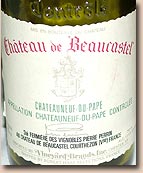 1990 Château de Beaucastel Châteauneuf du Pape, 13.5% alc.: Dark garnet
color, with a slight tinge of rust, fading to pink at the rim; wonderful
Châteauneuf character, with a note of sweaty barnyard, earth, leather and rich
plum, prune, currant and berry. Still well structured and on the way up; a deep
wine, smooth and seamless. Find this wine 1990 Château de Beaucastel Châteauneuf du Pape, 13.5% alc.: Dark garnet
color, with a slight tinge of rust, fading to pink at the rim; wonderful
Châteauneuf character, with a note of sweaty barnyard, earth, leather and rich
plum, prune, currant and berry. Still well structured and on the way up; a deep
wine, smooth and seamless. Find this wine
1990 Domaine du Pegau Châteauneuf du Pape, 13.5% alc.: Dark garnet color
with a hint of rust; classic Pegau aromatics, deep, dark and earthy, featuring
leather, mahogany and black fruit, all of which follows through on the palate;
like the Beaucastel, still well structured and not yet at its peak, and as it
opens, it becomes more and more gorgeous. Find this wine
1990 Vieux Télégraphe Châteauneuf du Pape, 1.5 ml, 14% alc.: Rusty dark
garnet color, and sweet and savory at the same time, with black olives, leather,
earthy black fruit and a note of mahogany; drinking really well now, and while I
think it will improve, it’s not quite as deep and as structured as the
Beaucastel or Pegau. Classic Châteauneuf du Pape. Find this wine
1990 Verset Cornas, 11-14% alc.: Looks like a glass of cloudy ink;
vegetal black olive and black fruit flavors and aromas, being smooth, dense and
righteous. My only complaint is that it’s a little too veged-out. Find this wine
1990 Sean Thackrey Napa Syrah Orion, 13.1% alc.: Rusty ink in a glass;
deep, dark and dense black fruit with minty (I know, I know…) overtones and a
little oak in the background; still tannic, powerful and monolithic, but it
opens nicely with a little air, becoming more harmonious. Find this wine
1997 Jamet Côte Rôtie, 13% alc.: More ink in a glass, with smoky, meaty
black olives and black fruit flavors and aromas; dense, structured and
ultra-smooth at the same time. My kind o’ stuff! Find this wine
I didn’t know that a 1990 theme had been suggested; I simply brought the next
wine along because it had been in the cellar for eight or ten years and I was
concerned that it might be starting to fade. I needn’t have worried…
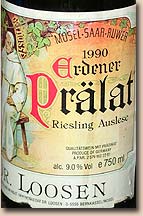 1990 Dr. Loosen Erdener Prälat
Riesling Auslese Gold Capsule Mosel Saar Ruwer,
9% alc.: Medium gold color; medium sweet, but not at all cloying, with nice
notes of mineral and petrol that take a backseat to the lovely ripe apple and
apricot until the finish, where the mineral takes over again. Lovely texture,
with perfect acidity and in no danger of fading anytime soon. A real treat, and
I took an extra pour just to be sure. I need to drink more great Riesling! Find this wine 1990 Dr. Loosen Erdener Prälat
Riesling Auslese Gold Capsule Mosel Saar Ruwer,
9% alc.: Medium gold color; medium sweet, but not at all cloying, with nice
notes of mineral and petrol that take a backseat to the lovely ripe apple and
apricot until the finish, where the mineral takes over again. Lovely texture,
with perfect acidity and in no danger of fading anytime soon. A real treat, and
I took an extra pour just to be sure. I need to drink more great Riesling! Find this wine
By the time I got to this last wine, my scribe skills were rapidly fading, but how could I not scratch something briefly about a
beautiful 17-year old J.J. Prum Auslese?
1990 Joh Jos Prüm Wehlener Sonnenuhr Riesling Auslese Mosel Saar Ruwer,
7.5% alc.: Classic Prüm here, with its vivid golden color and rich, sweet
apricot and honey flavors and aromas, excellent cut and long, long finish. So
much more than these few words can convey, and along with the Dr. Loosen, the
perfect way to finish up with the wine before switching to a great cup of Graeters’
Black Raspberry Chip Ice Cream. Find this wine
BACK
TO THE TOP
Gang of Pour Home Page |
Larry Meehan's Tasting Notes
|



 Champagne Jose Dhondt Blanc de Blancs à Oger Vieilles Vignes NV, 12% alc.:
Medium straw color, with lots of yeast and flint-y mineral, a solid core of
under-ripe apple and a little smoke in the background. Lots of zip and a heady
mousse; this gives a ton of everything I love about Champagne!
Champagne Jose Dhondt Blanc de Blancs à Oger Vieilles Vignes NV, 12% alc.:
Medium straw color, with lots of yeast and flint-y mineral, a solid core of
under-ripe apple and a little smoke in the background. Lots of zip and a heady
mousse; this gives a ton of everything I love about Champagne!  1987 Ridge Monte Bello, 92% Cabernet Sauvignon, 5% Merlot, 3% Cabernet
Franc, 11.7% alc.: Dark garnet color, with little rust to speak of; big dense
black currant nose, with some lavender, a nice whiff of Draper perfume and a
surprising note of bell pepper. Flavors echo with less bell pepper; well
structured and still a young wine in many respects, if this bottle is any
indication, with a solid core of fruit that’s not going to fade anytime soon.
Some found this a little “weird and atypical,” but I think it just needs a good
medium rare rib eye steak to really set it off.
1987 Ridge Monte Bello, 92% Cabernet Sauvignon, 5% Merlot, 3% Cabernet
Franc, 11.7% alc.: Dark garnet color, with little rust to speak of; big dense
black currant nose, with some lavender, a nice whiff of Draper perfume and a
surprising note of bell pepper. Flavors echo with less bell pepper; well
structured and still a young wine in many respects, if this bottle is any
indication, with a solid core of fruit that’s not going to fade anytime soon.
Some found this a little “weird and atypical,” but I think it just needs a good
medium rare rib eye steak to really set it off. 
 1989 Joseph Drouhin Clos de Vougeot Grand Cru, 13.5% alc.: Slightly rusty
ruby garnet color, with a stingy nose and middleweight earth, plums and cherries
on the palate; somewhat silky, with moderate tannins and acids, and a different
animal than the Dujac and Chevillon, but just as interesting in its own, more
well-behaved way.
1989 Joseph Drouhin Clos de Vougeot Grand Cru, 13.5% alc.: Slightly rusty
ruby garnet color, with a stingy nose and middleweight earth, plums and cherries
on the palate; somewhat silky, with moderate tannins and acids, and a different
animal than the Dujac and Chevillon, but just as interesting in its own, more
well-behaved way.  1998 Allemand Cornas Reynard, 12.5% alc.: Like drinking a glass of ink,
this is all bacon, black olives and floral fruit on the nose, so much so that I
just want to sit and smell it, but taste it I do, and while it’s not quite as
generous on the palate, it still shows that intense syrah character, turning
somewhat astringent on the finish. I usually take that astringency as an
indication of a wine that needs more time, and this one certainly does, but it
has the structure and depth of fruit to develop and improve for many years.
Hopefully, we’ll be around when Blackie opens another one, in, oh, say five
years or so…
1998 Allemand Cornas Reynard, 12.5% alc.: Like drinking a glass of ink,
this is all bacon, black olives and floral fruit on the nose, so much so that I
just want to sit and smell it, but taste it I do, and while it’s not quite as
generous on the palate, it still shows that intense syrah character, turning
somewhat astringent on the finish. I usually take that astringency as an
indication of a wine that needs more time, and this one certainly does, but it
has the structure and depth of fruit to develop and improve for many years.
Hopefully, we’ll be around when Blackie opens another one, in, oh, say five
years or so… Absinthe
Edouard Distiller's Proof. 72% (yeah, that's 144
proof to us on this side of
Absinthe
Edouard Distiller's Proof. 72% (yeah, that's 144
proof to us on this side of the pond). A recreation of one of the finest
Absinthes of its time from the fine folks at
the pond). A recreation of one of the finest
Absinthes of its time from the fine folks at
 Champagne Varnier-Fannière Brut Rosé Grand Cru NV, disgorged 05/25/06:
Salmon straw color, with the big mousse and the very active bead; the tight nose
only gives a hint of cherry-ish aroma, but the flavors pick it up big-time with
plenty of cherry and strawberry underscored with a fine, earthy minerality.
Rich, with excellent cut and yet a certain smoothness to it; I could drink this
stuff all night. I actually tried to go back for more, but the rabble had had
their way with it and there was nothing but an empty husk of glass.
Champagne Varnier-Fannière Brut Rosé Grand Cru NV, disgorged 05/25/06:
Salmon straw color, with the big mousse and the very active bead; the tight nose
only gives a hint of cherry-ish aroma, but the flavors pick it up big-time with
plenty of cherry and strawberry underscored with a fine, earthy minerality.
Rich, with excellent cut and yet a certain smoothness to it; I could drink this
stuff all night. I actually tried to go back for more, but the rabble had had
their way with it and there was nothing but an empty husk of glass.  Champagne Larmandier-Bernier Brut Rosé de Saignée Premier Cru, 12% alc.:
This make an immediate impression by way of its intense dark raspberry pink
color, probably as dark a rosé as I’ve had the pleasure of knowing, sparkling or
otherwise; it has all the activity you could ask for in the glass and in the
mouth, and dishes out intense cherry-raspberry flavors and aromas with the
requisite subtle earth and mineral underneath. Excellent cut and very good
intensity here, making for one very fine Brut Rosé indeed.
Champagne Larmandier-Bernier Brut Rosé de Saignée Premier Cru, 12% alc.:
This make an immediate impression by way of its intense dark raspberry pink
color, probably as dark a rosé as I’ve had the pleasure of knowing, sparkling or
otherwise; it has all the activity you could ask for in the glass and in the
mouth, and dishes out intense cherry-raspberry flavors and aromas with the
requisite subtle earth and mineral underneath. Excellent cut and very good
intensity here, making for one very fine Brut Rosé indeed.  1990 Château de Beaucastel Châteauneuf du Pape, 13.5% alc.: Dark garnet
color, with a slight tinge of rust, fading to pink at the rim; wonderful
Châteauneuf character, with a note of sweaty barnyard, earth, leather and rich
plum, prune, currant and berry. Still well structured and on the way up; a deep
wine, smooth and seamless.
1990 Château de Beaucastel Châteauneuf du Pape, 13.5% alc.: Dark garnet
color, with a slight tinge of rust, fading to pink at the rim; wonderful
Châteauneuf character, with a note of sweaty barnyard, earth, leather and rich
plum, prune, currant and berry. Still well structured and on the way up; a deep
wine, smooth and seamless.  1990 Dr. Loosen Erdener Prälat
Riesling Auslese Gold Capsule Mosel Saar Ruwer,
9% alc.: Medium gold color; medium sweet, but not at all cloying, with nice
notes of mineral and petrol that take a backseat to the lovely ripe apple and
apricot until the finish, where the mineral takes over again. Lovely texture,
with perfect acidity and in no danger of fading anytime soon. A real treat, and
I took an extra pour just to be sure. I need to drink more great Riesling!
1990 Dr. Loosen Erdener Prälat
Riesling Auslese Gold Capsule Mosel Saar Ruwer,
9% alc.: Medium gold color; medium sweet, but not at all cloying, with nice
notes of mineral and petrol that take a backseat to the lovely ripe apple and
apricot until the finish, where the mineral takes over again. Lovely texture,
with perfect acidity and in no danger of fading anytime soon. A real treat, and
I took an extra pour just to be sure. I need to drink more great Riesling!